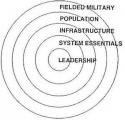America’s problem is not that it does not work like China. It is that it no longer works like America. The latest threat of a federal government shutdown this week drove the point home.
Depending on how you count them, the US has had three to four budget showdowns this year, each threatening to close down the government or trigger a default on the country’s debt. Given that the government is funded only up until November 18, there will be at least one more such fight this year. On top of that, on November 23, a bipartisan congressional committee that was set up as part of a compromise deal over lifting the US government’s borrowing limits in August, is due to report on how to cut $1,200bn from the budget over the next decade. If they cannot agree, a new set of battles could ensue until the end of the year.
Short-term measures passed by Congress to fund the government are nothing new in the US, nor is political posturing over budget spending. But in the words of one budget specialist, the spending negotiations have gone from being “routine and procedural to political and partisan”.
Washington’s budget battles have turned into something like the Israeli-Palestinian peace process, a euphemism for a process in which there is no peace and each side is continually nourished by the dreadful wrongs committed by the other.
As in the Middle East, violence begets violence.












 ).
).
Bookmarks